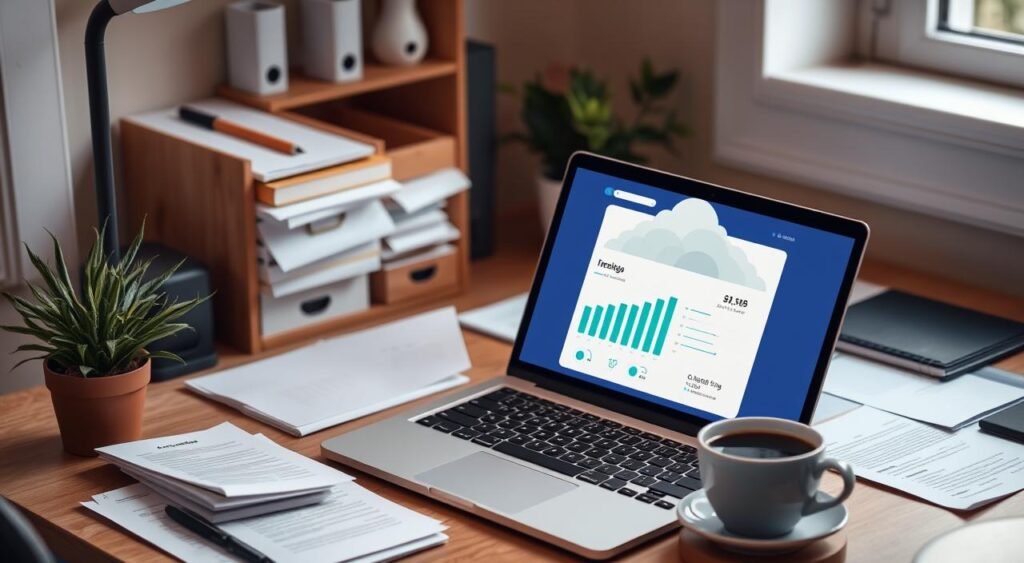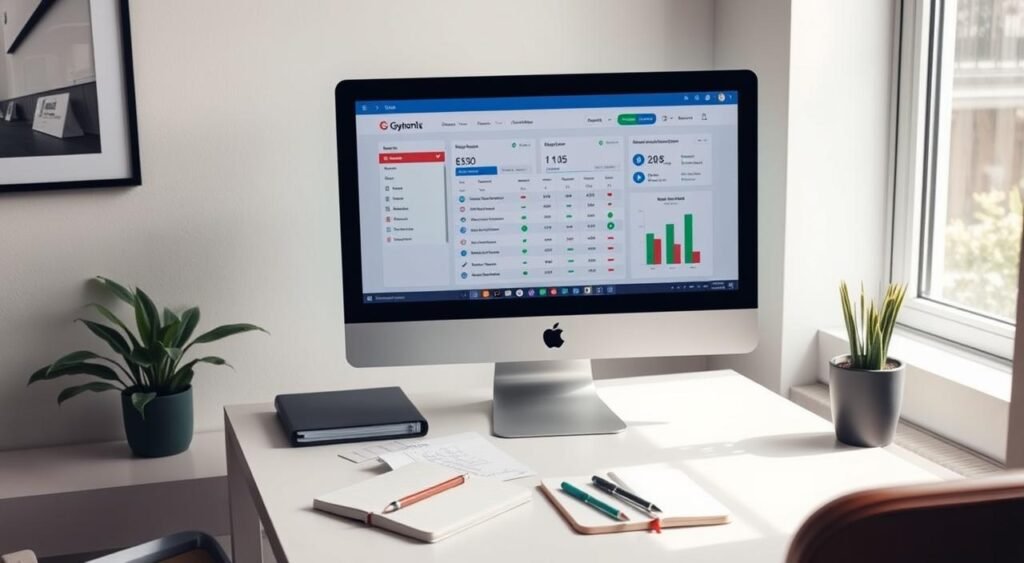Are you a small business owner looking for the perfect accounting software? It should be affordable yet meet all your financial needs. With so many options out there, finding the right tool for micro businesses can be tough.
For very small businesses, managing finances well is key to success. The best accounting software should make tasks like invoicing and expense tracking easy. It should also have strong features for small business financial management. Solutions like FreshBooks and QuickBooks Online are leaders in the field, offering easy-to-use interfaces and powerful tools.
Key Takeaways
- Access to top accounting software for micro businesses can significantly enhance financial management.
- FreshBooks and QuickBooks Online lead the market with user-friendly and feature-rich platforms.
- Effective accounting software should manage invoices, track expenses, and support overall financial decision-making.
- Integration and ease of use are crucial factors in selecting the right accounting tool.
- Ensure the software offers features tailored specifically to the needs of very small businesses.
Overview of Accounting Software for Micro Businesses
Accounting software is vital for micro businesses. It makes financial tasks easier, more accurate, and gives insights into the business’s health.
Why Accounting Software Matters
Choosing the right accounting software is key for small businesses. It helps keep records straight, manage money, and follow tax laws. It also cuts down on errors and saves time.
Good accounting software gives real-time reports. This lets micro businesses make smart choices and grow.
Features to Look for in Small Business Accounting Software
When picking accounting software, look for tools that are easy to use, offer detailed reports, and work on mobile devices. Important features include:
- Invoicing Capabilities: Manage and track invoices easily.
- Expense Tracking: Keep an eye on business spending in real-time.
- Inventory Management: Track stock levels and orders.
- Reporting: Get financial statements and reports to check business health.
- Mobile Accessibility: Use software from anywhere.
By choosing the right accounting software, small businesses can grow and be profitable without getting stuck in financial details.
Top Picks for Best Accounting Software for Very Small Business

For very small businesses, three top choices are FreshBooks, QuickBooks Online, and Xero. Each offers unique benefits for different needs.
FreshBooks
FreshBooks is great for those who don’t know much about accounting. It has plans like Lite at $19/month, Plus at $33/month, and Premium at $60/month. You can try it for free for 30 days before deciding.
FreshBooks is easy to use, perfect for service-based businesses. It has great invoicing, expense tracking, and time management tools. Plus, it offers up to 60% off for the first four months, saving you money.
QuickBooks Online
QuickBooks Online is known for its strong features and growth potential. It has four plans: Simple Start, Essentials, Plus, and Advanced. You can try it for free for 30 days. It also offers a 50% discount for the first three months, which is a big plus for growing businesses.
QuickBooks Online is top-notch for tax planning, payroll, and financial reports. It also integrates well with other tools, offering a complete solution for small businesses.
Xero
Xero is known for its analytics, project management, and inventory tracking. It’s great for businesses that need to manage multiple users. Xero has three main plans: Early, Growing, and Established. You can also try it for free for 30 days.
Xero has over 1,000 integrations, making it easy to connect with other tools. This makes it a top choice for streamlining business operations.
Choosing between FreshBooks, QuickBooks Online, and Xero depends on your business needs. Whether you need ease of use, scalability, or integrations, these platforms have the best solutions for managing your finances.
Most Affordable Accounting Software Options
Finding the right accounting software for a very small business can be tough, especially when money is tight. Luckily, there are some affordable tools that offer great features without costing a lot. Wave and Patriot Software Accounting are the top picks for affordable options.
Wave
Wave is known as one of the best affordable options for small businesses. It offers many features for free, making financial tasks like invoicing and tracking easier. Its easy-to-use design helps even those new to accounting to get started quickly.
Wave is special because most of its features are free. This makes it perfect for businesses trying to save money. It’s great for startups and small businesses because of its strong invoicing and transaction management.
Patriot Software Accounting
Patriot Software Accounting is another great choice for those watching their budget. It offers a low-cost solution without missing out on important features. It has tools like payroll processing and customer support.
Patriot Software Accounting is known for its affordable plans. It’s easy to set up and use, helping business owners manage their finances easily. You can learn more by visiting the U.S. Chamber of Commerce guide on free accounting tools for small businesses.
Wave and Patriot Software Accounting show that affordable accounting software can be very valuable. They help business owners manage their finances well and save money at the same time.
Cloud-Based Accounting Software for Very Small Business

In today’s digital world, cloud-based accounting software is key for small businesses. It brings many benefits that help businesses work better and more efficiently.
Benefits of Cloud-Based Solutions
The benefits of cloud solutions are many. You can access financial data anytime, making quick and smart decisions. With cloud-based accounting software for very small business, updates happen automatically without stopping work.
Also, your financial info is safe from hackers. This is because cloud systems have top-notch security.
Plus, teams can work together better. Accountants and bookkeepers can log in from anywhere. This makes teamwork and sharing info easier.
Top Cloud-Based Software Features
The best features of online accounting systems show why they’re so important for small businesses. They usually have:
- Easy integration with other tools, making data sharing smooth.
- Automated backups, so your data is always safe without you doing anything.
- Mobile access, letting you manage money on your phone or tablet.
For instance, Xero and QuickBooks Online offer features like automatic bank feeds. This means you can match bank transactions daily. It keeps your cash flow up to date. These features, along with regular updates and strong security, make cloud-based accounting software for very small business essential for today’s business needs.
Best Accounting Software for Solopreneurs
For solopreneurs, finding the right accounting software is key. It should be easy to use and efficient. This way, solopreneurs can focus on their main business tasks. We’ll look at what features are important and suggest the best accounting tools for solo entrepreneurs.
Key Features for Solopreneurs
An ideal accounting tool for solo entrepreneurs should have these features:
- Intuitive Design: The software should be easy to use. Solopreneurs can manage their finances without needing to know a lot about accounting.
- Invoicing: It’s important to have good invoicing tools. This lets solopreneurs send professional invoices fast.
- Time Tracking: Time tracking helps solopreneurs keep track of billable hours.
- Expense Management: It should be easy to track and manage expenses. This keeps financial records accurate and simple.
Recommended Software for Solo Entrepreneurs
Based on expert reviews and experience with small business finance, here are some top picks:
- FreshBooks: Starting at $19 per month, FreshBooks has features like time tracking, invoicing, and project management. It’s known for great customer support.
- Wave: Wave is free for invoicing, expense tracking, and basic reporting. There’s an extra plan at $16 per month for more features.
- QuickBooks Self-Employed: Starting at $20 per month, it has tools like tax preparation, mileage tracking, and PayPal integration.
- TrulySmall Accounting: Priced from $20 per month, it’s great for sole proprietorships with fewer than 500 transactions a year. It’s simple and efficient.
- Moxie: Starting at $20 per month, Moxie has strong features for solopreneurs.
Choosing the best accounting software for solopreneurs depends on what you need and your budget. But the options listed above are a good place to start for solo entrepreneurs looking to manage their finances better.
User-Friendly Accounting Software for Micro Businesses

Micro businesses can greatly benefit from accounting software that’s easy to use. This software should have a low learning curve and high productivity. Ease of use and good support are key.
Ease of Use
The most important thing is how easy the software is to use. Wave Accounting is great because it’s easy to navigate and has clear dashboards. This makes managing finances simple, even for those who aren’t experts.
QuickBooks Online and Xero are also top picks. They are designed with the user in mind and have great mobile apps. These features help make financial tasks easy, even for those who aren’t accountants.
Support and Training Resources
Good support and training are crucial for a smooth experience. FreshBooks offers lots of help through tutorials, webinars, and customer service. This ensures small business owners can use the software easily.
Zoho Books also has great support and training, which is helpful for businesses using advanced features. QuickBooks and Xero have huge help centers and forums. These resources help micro businesses get the most out of their software.
Choosing the right accounting software for micro businesses means looking at ease of use and support. Software with strong training and support can make a big difference. It helps small businesses run smoothly.
Small Business Accounting Software Comparison
When looking at small business accounting software, it’s key to know the features and prices. This helps businesses pick the right tool for their needs. It’s all about finding the best mix of features and cost.
Feature Comparison
Small business accounting software usually has many features. These include ledgers, invoicing, tax management, and more. TatvaSoft says it’s important to look at automation, reporting tools, and how well the software grows with your business.
Wave offers free software for very small businesses. It helps with tracking income and expenses. It also makes financial statements and automates tasks.
- Automation: Automation reduces errors and boosts efficiency.
- Reporting Tools: Good reporting tools give deep insights into finances.
- Scalability: Scalable software grows with your business.
- Ease of Use: Easy-to-use software saves time and effort.
When choosing software, think about customer support, security, and how well it integrates with other tools. QuickBooks Online, Xero, FreshBooks, Sage Business Cloud Accounting, and Zoho Books are all good options. They offer features for different business needs.
Pricing Comparison
Prices for accounting software vary a lot. QuickBooks Online starts at $15 a month. FreshBooks is more affordable at $4.50 a month, but has limits. Xero’s basic plan is $12 a month, but has some restrictions.
Sage Accounting costs $346 a year, but doesn’t have a free trial. Wave is free for very small businesses.
- QuickBooks Online: Starting at $15/month
- Xero: $12/month with limitations in the basic plan
- FreshBooks: $4.50/month with client restrictions
- Sage Accounting: $346/year with no free trial
- Wave: Free, geared towards very small businesses
By comparing small business accounting software, businesses can find the best fit. This helps with financial management and makes operations more efficient.
Best Finance Software for Very Small Business

Looking for the best finance software for small businesses means finding tools that help with budgeting, forecasting, and analysis. These tools are more than just accounting. They are designed for businesses with limited resources.
Top picks include FreshBooks, QuickBooks Online, Xero, and Sage 50 Accounting. They are known for their strong features and wide integrations. Each one offers unique benefits for different business needs.
Top Finance Management Tools
FreshBooks is highly rated, thanks to 4,400 GetApp reviews. It has a fast client payment system that lets businesses get paid 11 days faster. It also sends automated late payment reminders to help manage finances better. The software works well with many business apps to make accounting easier.
QuickBooks Online is great for small businesses with a budget. It offers a 50% discount for three months. It’s perfect for those who need automated accounting and integration with CRMs and e-commerce platforms.
Xero is best for small businesses needing many users and strong reporting tools. It offers a 75% discount on its Business Edition plans for six months. This makes it a good choice for growing small businesses.
Sage 50 Accounting is ideal for companies needing to track inventory well. Like the others, it provides top-notch financial management tools for efficient business operations.
Integration with Other Business Tools
When choosing finance software for small businesses, integration is key. FreshBooks and QuickBooks Online integrate well with many business tools. This includes CRMs, project management software, and e-commerce platforms. It makes for a smooth and connected work environment.
Xero and Sage 50 Accounting also offer great integration. These integrations help with better collaboration and data sharing. They make financial management and decision-making more efficient.
In summary, the best finance software for small businesses should have great financial tools and easy integration with other business tools. This ensures strong and connected business operations.
Easiest Accounting Software for Small Business

Choosing the easiest accounting software for small business means looking for simplicity and efficiency. This software is designed to make financial management easier for business owners. It aims to reduce the complexity of handling finances.
Simplicity in Setup and Use
The main benefit of simple accounting solutions is their user-friendly design. This allows business owners to start quickly without needing a lot of training. For example, FreshBooks and Wave have easy setups that guide users through basic accounting tasks.
This ease of use is key, as shown by a survey. It found that 95% of small business owners value expense tracking for accurate financial records.
Automation Features
Automation is a key feature of modern accounting software. Features like bank feeds, recurring invoicing, and automatic payment reminders save a lot of manual work. A survey showed that 87% of small business owners see automated invoicing as essential.
By using automated accounting, businesses can improve their operations. They can focus more on their main activities.
FreshBooks is known for its automated features, making it a top choice for small businesses. It ensures timely invoicing and payment reminders, helping with cash flow management. Wave also offers simple, affordable automation, making advanced financial tools available to very small businesses.
Conclusion
Choosing the right accounting software for a small business is crucial. It must meet specific needs and offer the right features. Many small businesses can’t afford a full-time accountant, so picking the right software is key.
Cost, ease of use, and feature strength are important. Also, good support and integration with other tools matter a lot. This ensures the software fits well with the business.
For those on a tight budget, Zoho Books and Wave are great choices. They offer free or low-cost plans. For more features, options like FreshBooks and QuickBooks Online are affordable.
These platforms help with invoicing, tracking expenses, and more. They cater to different business needs. QuickBooks Online is known for its wide range of features. Xero is praised for its easy-to-use interface and support for multiple currencies.
FreshBooks is great for service-based businesses. Wave is a cost-effective option for startups. SaasAnt Transactions helps manage QuickBooks transactions efficiently. Choosing the right software is essential for managing finances well and succeeding in the market.
FAQ
Why is accounting software important for very small businesses?
Accounting software is key for small businesses. It makes financial tasks easier and more accurate. It helps owners see how their business is doing, so they can grow and make more money.
What are the key features to look for in accounting software for micro businesses?
Micro businesses need software that’s easy to use and gives detailed reports. It should handle invoices, manage inventory, and work on mobile devices. These features help manage finances well.
Which accounting software is best suited for very small businesses?
For small businesses, FreshBooks, QuickBooks Online, and Xero are great choices. FreshBooks is easy to use and good for service businesses. QuickBooks Online is powerful and grows with your business. Xero offers deep analytics and works well for teams.
What are some affordable accounting software options for very small businesses?
Wave and Patriot Software Accounting are cheap but effective. Wave is free and great for invoices and managing transactions. Patriot Software Accounting is affordable and has the basics for accounting.
What are the benefits of using cloud-based accounting software for very small businesses?
Cloud-based software like Xero and QuickBooks Online gives real-time access to your finances. It updates automatically and is secure. It also works well with other tools, backs up your data, and is mobile-friendly.
What accounting software is recommended for solopreneurs?
TrulySmall Accounting is perfect for solopreneurs. It’s easy to use, handles invoices, tracks time, and manages expenses. It makes running a business simpler.
How can micro businesses ensure their accounting software is user-friendly?
Choose software with a simple design and clear dashboards. Look for help like tutorials and webinars. Good customer service is also key for a smooth experience.
What should businesses consider when comparing small business accounting software?
When comparing software, look at features, prices, automation, reports, and how it can grow with your business. Pick software that fits your needs and budget.
What are some of the top finance management tools for very small businesses?
The best tools help with budgeting, forecasting, and analysis. They should work well with CRM systems and e-commerce platforms. QuickBooks Online and Sage 50 Accounting are good examples.
Which accounting software is the easiest to use for small businesses?
FreshBooks and Wave are easy to use for small business owners. They have simple setups, clear interfaces, and automate tasks. This makes accounting straightforward.












